"Quitting is hard, but if you can actually do it, there are a lot of benefits that you might not have thought about," said study author Megan E. Piper.
"If you thought you'd have more stress, that quitting would put more stress on your relationships, or that you'll feel worse forever, that isn't the case," said Piper, an assistant professor of medicine at the University of Wisconsin School of Medicine and its Center for Tobacco Research and Intervention.
The findings don't make specify how much of a difference quitting makes in percentage terms. Still, they show a definite gain, she said. Three years after stopping, study participants who had quit reported fewer stressors and improved mood compared to those who continued smoking.
Piper said she and her colleagues wanted to see if they could confirm assumptions about smokers feeling better after they quit and "put some science behind what everybody thinks is true."
Quality of life
One way to do that is to look at how people describe their quality of life. That's tricky, Piper said, since quality of life tends to decline as people age. Even so, the researchers figured they could examine trends over time by comparing people who kept smoking to those who quit.
The study authors looked at the results of surveys of 1 504 people from Wisconsin, 58% women, 84% white - who took part in a smoking cessation study that began between 2005 and 2007. Participants were assigned to one of six groups, some of them using a nicotine patch, nicotine lozenges, the drug bupropion, a combination of those aids or a placebo. All also received counseling to help them quit.
Researchers followed the participants for three years and tested their blood to see if they had actually quit. They also asked about self-regard, standard of living, relationships, friendships and other measures of quality of life.
вторник, 20 декабря 2011 г.
National report shows decreasing teenage use of alcohol, cigarettes
Colorado Attorney General John Suthers said Thursday that a new report from the National Institute on Drug Abuse showing increasing youth consumption of marijuana should be a cause of concern for Coloradans.
According to the 2011 Monitoring the Future Survey, teen marijuana use has increased, most notably among 10th and 12th graders. Among 12th graders, 36.4 percent of those surveyed reported that they had used marijuana at least once within the previous year, up from 34.8 percent in 2010. The 10th graders surveyed also reported a similar increase in use with 28.8 percent of those surveyed reported that they had used marijuana at least once within the previous year, up from 27.5 percent in 2010.
These results tracked parallel to both 10th and 12th graders reporting a lower perception of risk associated with marijuana use. Both demographics reported less perception of risk associated with using marijuana once or twice, smoking marijuana occasionally and smoking marijuana regularly. There is a clear relationship between teenage marijuana use and teens' perception of risk. As the perception of risk of the drug decreases, marijuana use increases.
"These trends are especially concerning given the research on the effects of marijuana use on the teenage brain," Suthers said. "The increasing accessibility and acceptability of marijuana for teenagers in Colorado should be of concern to all of us."
According to the 2011 Monitoring the Future Survey, teen marijuana use has increased, most notably among 10th and 12th graders. Among 12th graders, 36.4 percent of those surveyed reported that they had used marijuana at least once within the previous year, up from 34.8 percent in 2010. The 10th graders surveyed also reported a similar increase in use with 28.8 percent of those surveyed reported that they had used marijuana at least once within the previous year, up from 27.5 percent in 2010.
These results tracked parallel to both 10th and 12th graders reporting a lower perception of risk associated with marijuana use. Both demographics reported less perception of risk associated with using marijuana once or twice, smoking marijuana occasionally and smoking marijuana regularly. There is a clear relationship between teenage marijuana use and teens' perception of risk. As the perception of risk of the drug decreases, marijuana use increases.
"These trends are especially concerning given the research on the effects of marijuana use on the teenage brain," Suthers said. "The increasing accessibility and acceptability of marijuana for teenagers in Colorado should be of concern to all of us."
Marijuana found in charcoal load at Arizona border

Federal officers seized more than a half-million dollars worth of marijuana hidden in a load of charcoal last week.
Last Friday, Customs and Border Protection officers at the Mariposa Cargo facility in Nogales randomly selected a tractor trailer for a non-intrusive inspection.
A narcotics canine was alerted to the presence of drugs inside the shipment, according to CBP.
The truck was off loaded and officers found a false compartment in the front wall which contained 87 bundles of marijuana weighing more than 1,000 pounds.
The 28-year-old Mexican male driver was arrested and turned over to U.S. Immigration and Customs Enforcement's Homeland Security Investigations.
понедельник, 12 декабря 2011 г.
Texas Reduces Amount Allocated To Tobacco Prevention Programmee

Texas is one of the places in the US where children get into smoking from a very tender age, say about 14 years. This has led to a rise in the number of cancer cases and eventually death in young age. Not for once but for many times it has been said that tobacco is one such cause of death in Texas which could be preventable.
In Texas alone, more than 24,000 people die annually, but it seems very little on the part of the state government to be doing something about it. There is no end to revenues which gets generated from tobacco tax or from other tobacco settlements.
But in comparison to last year allocation of money being used on activities that would focus on preventing tobacco use is quite less. As per official figures, more than $1.9 billion is generated for this year but only $5.5 million is allocated for such activities, which is quiet less than the amount that was allocate last year, said James Gray who is Texas Director of government relations for the American Cancer Society.
Tobacco prevention activities are one of the most effective methods to prevent youth from smoking. This fact is not hidden from the state government and then also if they are not encouraging such activities by not spending appropriate fund then they are giving rise to tobacco-related illnesses.
These diseases need lot of money which is not only taxing for patients but also for the state health system. This was the reason that the multistate lawsuit was filed against tobacco giants in 1998.
As per this settlement, tobacco company owners had agreed to pay Texas $15 billion over 25 years as a part of compensation.
All these facts have been added in the study called "A Broken Promise to Our Children: The 1998 State Tobacco Settlement 13 Years Later” which was taken out by number of health institutions.
Report shows slower progress toward reducing teen tobacco use

The Minnesota Department of Health (MDH) released new information this week showing that after a decade of sharp declines in tobacco use among teens, progress is slowing.
In addition, more than 50 percent of high school students are still exposed to secondhand smoke, despite the passage of the Freedom to Breathe Act in 2007. Equally concerning is that the use of menthol cigarettes has more than doubled among teen smokers since 2000. These findings are included in the report, Teens and Tobacco in Minnesota 2011; Results from the Minnesota Youth Tobacco and Asthma Survey.
"We've made great progress in reducing tobacco use since 2000, but the most recent findings in this new report give us little to celebrate," said Dr. Ed Ehlinger, Minnesota Commissioner of Health. "We are failing our youth when you consider that they use tobacco at higher rates than adults and are still being exposed to secondhand smoke. We are setting them up for a future of tobacco-related illness and premature death."
Ehlinger noted that tobacco use continues to be the nation's leading cause of preventable disease and death and that teens are especially vulnerable to picking up the habit. "Too many teens continue to be influenced by the tobacco industry's slick marketing tactics. It is critical that we step up our prevention efforts because 80 percent of adult smokers began when they were under 18," Ehlinger said.
Key findings from the report include:
Between 2008 and 2011, the percentage of middle school students who used any tobacco products in the past 30 days declined from 6.9 percent to 5.6 percent. At the high school level, the percentage declined slightly from 27.0 percent to 25.8 percent. Neither of these decreases is statistically significant. In comparison, 22 percent of adults use tobacco.
Progress in reducing exposure to secondhand smoke has slowed since 2008, after many years of strong declines. Exposure declined slightly between 2008 and 2011, from 55.4 to 52.5 percent for high school students and from 39.6 percent to 37.7 percent for middle school students.
Among high school students, preference for menthols has more than doubled since 2000 and is continuing to rise; 47.3 percent of high school smokers usually smoke menthols today, compared to 39.1 percent in 2008 and 19.9 percent in 2000. Menthol appears to make it easier for young people to start smoking.
One in seven high school students (14.3 percent) report that they have tried snus in their lifetime, and 4.9 percent report using snus in the last 30 days. Snus is a new smokeless tobacco product that comes in small pouches.
More than one-fourth of high school students (28.6 percent) and 6.8 percent of middle school students report that they have tried flavored cigars and little cigars at some point in their lives. (The FDA recently banned candy flavors, fruit flavors, chocolate and other sweet flavors in cigarettes, but not cigar products.)
The percentage of students who see or hear commercials about the dangers of smoking one or more times per week declined significantly between 2008 and 2011 for both middle school students (from 41.2 percent to 31.8 percent) and high school students (from 48.4 percent to 36.0 percent).
The tobacco industry is increasingly active on popular social networking and video-sharing internet sites. One in four high school students (26.3 percent) report seeing videos or clips showing smoking most or some of the time on YouTube or other video-sharing sites, and 20.2 percent report seeing "pages" or "groups" for tobacco products on Facebook.
"This report demonstrates the need to maintain long-term teen tobacco prevention strategies," Ehlinger said. "If we rest on our laurels, we will continue to see our progress slow, or even reverse itself, and we cannot stand for that."
Ehlinger noted a number of strategies that public health officials across the country have used to successfully reduce and prevent youth tobacco use, including:
Price increases on tobacco products.
Counter-advertising mass-media campaigns that include TV and radio commercials, posters, and other media messages to counter pro-tobacco marketing.
Comprehensive school-based tobacco-use prevention policies and programs, such as tobacco-free campuses.
Community interventions that reduce tobacco advertising, promotions and commercial availability of tobacco products.
Ehlinger said MDH will continue working with partners across the state to explore all strategies for reducing teen tobacco use.
The department's Tobacco Prevention and Control Program administers grants to reduce tobacco use and exposure, works together with the Statewide Health Improvement Program (SHIP) and other community-based initiatives, and collaborates with statewide partners to reduce Minnesotans' exposure to secondhand smoke and to help people who use tobacco quit. In addition to working on multiple fronts to discourage youth tobacco use, the program works with diverse communities to eliminate health disparities caused by tobacco use and exposure.
SHIP, which was included in Minnesota's landmark 2008 health reform legislation, aims to help Minnesotans live longer, healthier lives by reducing the burden of chronic diseases caused by tobacco use and obesity.
Tobacco merchants resent govt apathy
An All Kerala Tobacco Merchants Association meet was held yesterday at Casino Hotel auditorium to discuss the problems faced by the tobacco merchants.
Association president K Venkitachalam said, "The government is doing wrong to more than two lakh dealers in Kerala by conducting illegal raids at shops selling tobacco."
It's been one year since this association was formed and problems are ever increasing, he said. The government is collecting taxes on tobacco and seizing the same material stating that a minimum distance of 400 metres should be maintained from schools.
This kind of action should be reverted, he pointed out. "We have given petitions to the chief minister and the deputy general of police," said Venkitachalam.
Also present at the event were Vyapari Vyavasayi Ekopana Samithi state president T Nasurideen, secretary Dr M Jayaprakash, Youth Wing state president Sijo Chirakkekaren, Thrissur city unit secretary Jaison Erinjery, Jacob Varghese of ITC and Kozhikode secretary Sethumadhavan.
Association president K Venkitachalam said, "The government is doing wrong to more than two lakh dealers in Kerala by conducting illegal raids at shops selling tobacco."
It's been one year since this association was formed and problems are ever increasing, he said. The government is collecting taxes on tobacco and seizing the same material stating that a minimum distance of 400 metres should be maintained from schools.
This kind of action should be reverted, he pointed out. "We have given petitions to the chief minister and the deputy general of police," said Venkitachalam.
Also present at the event were Vyapari Vyavasayi Ekopana Samithi state president T Nasurideen, secretary Dr M Jayaprakash, Youth Wing state president Sijo Chirakkekaren, Thrissur city unit secretary Jaison Erinjery, Jacob Varghese of ITC and Kozhikode secretary Sethumadhavan.
Shook Hardy loses part of its tobacco practice

Part of Shook Hardy & Bacon’s famed tobacco practice is moving to a different law firm.
Hughes Hubbard & Reed, a New York-based firm, will open a Kansas City office to assume Shook’s defense work for Lorillard Tobacco.
Kansas City-based Shook retains Philip Morris USA, the industry’s dominant tobacco company best known for its Marlboro brand.
Industry insiders said the move reflected tobacco companies’ desire to be represented exclusively by their outside law firms rather than have a firm also represent an industry rival.
Lorillard and Philip Morris recently have taken different stances on how to respond to tighter regulatory controls by the Food and Drug Administration.
Eight Shook lawyers — six partners and two of counsel to the firm — will move to the Hughes firm, effective Jan. 1.
Hughes will open in the 2345 Grand Blvd. building, about a block from the Shook office tower at Crown Center.
Shook managing partner John Murphy said 17 or 18 staff members also would make the move. The firm did not name the lawyers who will follow the Lorillard business.
It will take until about June 30 for Shook to completely wind down all of its Lorillard work, Murphy said.
The move of Lorillard, which makes Kent, Newport and other cigarette brands, was first reported online by Am Law Daily.
Murphy said Shook had been successful at trial in representing Philip Morris in “significantly more cases” than Lorillard. He declined to compare or quantify the size of the business that Shook did with the two tobacco giants.
Shook’s size and reputation have grown over the years partly because of its products liability litigation work for tobacco companies.
This will be the first Midwest expansion for the Hughes firm, which also has offices in Los Angeles; Miami; Washington, D.C.; Paris; and Tokyo. It has about 300 lawyers in all.
пятница, 25 ноября 2011 г.
MCDH and Centegra Partner For Cease-Smoking Class

McHenry County Department of Health and Centegra Health System are partnering to offer a seven-week quit smoking class for adults beginning on Thursday, January 12.
Classes will be held from 6 to 7:30 p.m. every Thursday at Centegra Health Bridge Fitness Center, 10450 Algonquin Road, Huntley, according to a MCDH release.
A $25 course fee, payable at the first class, is refundable if registered participants attend all seven sessions. Class members also will receive a free three-day pass to the Health Bridge Fitness Center, the press release said.
During the class, instructors will teach practical ways to end nicotine addiction through group support and behavior modification. They also will review nicotine replacement products currently on the market. Instruction is provided by MCDH staff members who are trained in the American Lung Association’s “Freedom from Smoking” program.
Brazil bans smoking in enclosed public places

The Brazilian Congress has passed a bill banning smoking in enclosed public places nationwide.
Smoking bans are already in Sao Paulo, Rio de Janeiro and other big cities.
The new law goes one step further. It makes illegal designated smoking rooms in airports and bars that exist even in those places with a ban already in place.
It also raises taxes on tobacco products and is forcing a minimum price on the products, increasing costs for consumers by up to 55 percent within four years.
The law is in part aimed at cigarettes that enter the country illegally, mostly over the border with Paraguay. Those are sold for a fraction of the price of Brazil-made cigarettes.
President Dilma Rousseff is expected to sign the bill into law soon.
вторник, 15 ноября 2011 г.
E.L. marijuana policy punishes illegal use only

Despite a legal development last week that gives police the power to seize medical marijuana from registered patients, MSU and East Lansing police said they have not ramped up efforts to shut down the herbal alternative on campus.
Last week, Michigan Attorney General Bill Schuette issued an opinion that effectively allows police officers to confiscate medical marijuana from patients . If a patient is stopped for another reason, such as a traffic stop, an officer can take away any amount of the substance in their possession and cannot return it.
But on campus, police policy has not changed as a result of the ruling — patients who legally are allowed to have marijuana will not see their medicine taken, MSU police Sgt. Florene McGlothian-Taylor said.
“We don’t confiscate as long as the individual is in compliance with the law,” Taylor said.
University policy prohibits marijuana use on campus, meaning students are subject to university punishment. Students, however, can break their housing contract with no penalty if they are a medical marijuana patient.
East Lansing police also said they don’t take away marijuana from medical marijuana patients unless a patient has it confiscated for using legal marijuana in an illegal way, East Lansing police Capt. Kim Johnson said.
“Even the people with the cards can’t do certain things with it,” Johnson said. “(But) if they fall within the law, we wouldn’t be taking it.”
The opinion was issued on the grounds that forcing officers to return the drug is a conflict of state and federal laws and therefore would be forcing them to commit a federal crime.
“The people of this state, even in the exercise of their constitutional right to initiate legislation, cannot require law enforcement officers to violate federal law,” Schuette wrote in the opinion.
But Brian Fenech, an Ann Arbor defense attorney who specializes in medical marijuana, said the ruling is a blatant distortion of the act passed by voters.
“It’s clear from the law that’s not how it was intended to be handled,” Fenech said. “It’s another one of Schuette’s attempts … to try and usurp the will of the people by creating law out of whole cloth.”
The Michigan Medical Marihuana Act passed with a ballot initiative in 2008. Since then, about 119,000 residents have become registered as medical marijuana patients, according to numbers from the state of Michigan.
“I think it’s hypocritical if it’s a medicine,” English sophomore Colin Konkel said. “If a person has permission to use that substance, they should be allowed to have it on them without it being confiscated.”
Most smokers want to quit but few do, a CDC report finds

When it comes to quitting smoking, the lungs might be willing but the flesh is weak. A new report from the Centers for Disease Control and Prevention finds that while about 69 percent of smokers last year wanted to quit, only about a tenth were able to do so.
The CDC's Morbidity and Mortality Weekly Report used data from a large national survey from 2001 through 2010. Among the smokers surveyed most - 68.8 percent - wanted to quit for good in 2010, and 52.4 percent tried to quit in the previous year. Only 6.2 percent succeeded, however.
When broken down by race and ethnicity, 75.6 percent of blacks were interested in quitting, followed by 69.1 percent of whites and 61 percent of Latinos. Blacks also had the most attempts at quitting (59.1 percent), followed by whites (50.7 percent). But more whites were likely to quit smoking than blacks - 6 percent versus 3.3 percent. The discrepancy, the report said, could be due to blacks' lower use of proven stop-smoking treatments as well as their higher use of menthol cigarettes, which may be linked with fewer successful quit attempts among blacks.
People who had more education were more likely to try to quit compared to those with less education, and they were more likely to succeed: 11.4 percent of smokers with an undergraduate degree were able to quit compared to 3.2 percent of smokers who had at most completed high school.
Just under half of study participants who saw a healthcare professional said they were advised by them to stop smoking. Among current and former smokers who were able to quit in the last two years, 31.7 percent used counseling, stop-smoking medication or both. Among people age 25 to 64, attempts at quitting went up from 2001 to 2010.
Smoking an addiction, not a habit, lung association says
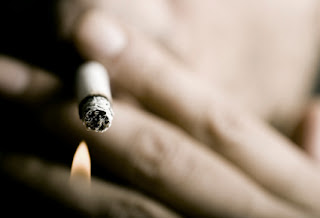
Leah Heneghan was so afraid of exposing others to the stench of cigarette smoke after she'd lit up that she took to carrying around a can of Febreze.
The smoker of 18 years, who had made several attempts to stop over the years, knew it was time to quit for good.
"This time it just feels like some-thing clicked in my head," she said. "My entire being agreed to it this time instead of fighting me."
It wasn't easy. Heneghan, 37, the creative director for Vancouver Craft Beer Week, had to stop drinking the very beverage she is paid to market because it made her want to smoke.
She switched from coffee - another trigger - to tea, drank lots of water and didn't go out as much.
Nicotine withdrawal caused her to be moody and short with people.
"You have to realize it's not you being angry at someone; it's this horrible little addiction trying to fight its way back."
And addiction, many are arguing, is exactly the word to describe chronic smoking. In recognition of Addictions Awareness Week, which started Mon-day, the BC Lung Association is calling for the term "addiction" to replace the word "habit" when referring to tobacco smokers.
"The amount of times that I've tried to quit and I haven't been able to over the years - you can't tell me that that's a habit," Heneghan said. "'Habit' doesn't seem like it's a serious enough word."
Nicotine dependence is included in the manual used by doctors to diagnose psychiatric disorders and has predictable withdrawal symptoms, including irritability, anxiety and cravings, said Dr. Milan Khara, clinical director of the tobacco dependence clinic for the Vancouver Coastal Health Authority. "So really, by many measures, this meets the standard for an addiction and not a habit or a life-style choice."
And although the withdrawal symptoms experienced by smokers are not as traumatic as for those addicted to "hard" drugs such as heroin or cocaine, nicotine is in many ways more addictive because it enters the brain within seconds of inhalation, Khara said.
"The brain is actually altered by exposure to nicotine. That change is what leads to withdrawal symptoms when, in fact, a smoker does stop smoking."
Introducing a change in terminology is important because smokers are much more likely to seek treatment when they think of it as an addiction rather than a question of willpower, Khara said. The two treatments that Khara says have been clinically proven to help smokers quit are counsel-ling from a health care provider and medications delivered via gum and patches.
The B.C. government began subsidizing nicotine-replacement therapies on Sept. 30. To get the gum and patches at no charge, patients must first call 8-1-1 and register for the pro-gram with a nurse. Two smoking-cessation drugs are also covered under Pharmacare.
But for Heneghan, it wasn't counsel-ling or gum that made the difference this time; it was apps. One told her how many cigarettes she would have smoked and how much she would have spent on them; the other provided access to a community of people who were trying to quit, where she could post how she was feeling and get positive reinforcement: "It makes you feel like you've got this real sup-port community. That probably was the thing that made the biggest difference to me."
вторник, 1 ноября 2011 г.
Florence smoke-free ordinance takes effect Tuesday

Restaurants and bars within Florence city limits will go smoke-free Tuesday when the long-anticipated smoking ordinance officially takes effect.
Florence City Council adopted the ordinance May 9 following years of contentious debate. The measure passed by a 5-2 majority of council members and will apply to most public indoor gathering places within the city, including restaurants and bars.
While some restaurants had to prepare for the changes by removing smoking sections and ashtrays and informing customers, other restaurants and bars in both the city and in Florence County went smoke-free long ago and said they felt the ordinance was overdue.
One of those restaurants is Stefano’s, which eliminated its smoking section several years ago Stefano’s owner Steve Toniolo said he made the decision because he felt the benefits outweighed any possible negativity. He said he was pleasantly surprised by the reaction of both smokers and non-smokers alike.
“We had a long wait for the non-smoking section, so we decided to just decorate outside, put out some concrete benches and smokeless ashtrays out there and people just go outside to smoke a cigarette,” he said.
Toniolo said that he feels business actually increased when he decided to make the establishment smoke-free and said it provides a better atmosphere for every customer trying to enjoy a meal.
“Everybody seems more happy. Even the people who do smoke, they don’t really have a problem with going outside and smoking a cigarette,” he said.
Many restaurant owners said although the impact of the smoking ordinance will not truly be known until it takes effect, they hope to retain their customers despite any backlash from smokers.
The ordinance prohibits smoking in enclosed buildings and spaces within the city, but allows for smoking on open decks, balconies and patios of restaurants.
Monroe mayor in hot water over smoking allegations

Current and former Monroe employees along with resident business owners allege Mayor Michael Gabbianelli smokes in his third-floor town hall office.
“He always smokes in his office and still does,” said Alma Alexander, a longtime tax office employee who retired in June.
Resident business owner Dave Montizer said the mayor lit up in a private meeting last year with zoning board members and his attorney Richard Kaser, who couldn’t be reached for comment.
“He was smoking a cigarette in the open,” Montizer said. “My lawyer said, ‘You’re smoking in a township building …’ ”
Montizer said Gabbianelli replied, “You don’t (expletive) like it, there’s the (expletive) door.”
Former township Mayor Jack Luby has heard similar tales. His two children work for the township.
“I’ve heard people say they’re (ticked) by it and told him ‘You can’t smoke in here. Go outside,’ ” Luby said. “Evidently the rules are made for everybody else.”
Monroe’s smoke-free workplace policy was adopted by Luby’s administration in 1997. Each violation carries a fine between $100 and $1,000, along with up to 30 days community service. People who smoke in public or government spaces are subject to $200 fines, according to state law.
A Monroe police officer said, on the condition of anonymity, secondhand smoke from the mayor’s office sometimes travels via air ducts into the police station.
When asked in their town hall offices if the mayor’s smoking was a nuisance, about a dozen township employees paused before replying for the record, “No comment.” Two other employees answered they weren’t aware the mayor smokes.
In an emailed response from township solicitor Chuck Fiore, Gabbianelli wouldn’t address smoking allegations. Monroe Police Chief Joseph Smart and other police administrators didn’t comment Monday. TRICO Municipal Joint Insurance Fund insures Monroe’s town hall. TRICO executive director Paul Miola didn’t comment Monday.
It’s the latest in a growing number of problems for the part-time Democratic mayor, who faces growing scrutiny for allegedly violating state or local regulations.
среда, 26 октября 2011 г.
Selling tobacco via vending machines means a big fine

The legislation means traders could face a fine of thousands of pounds or even a prison sentence if they sell directly to the public via machines.
It will also be illegal to display the tobacco advertising that would normally be present on a vending machine.
Although the law applies regardless of the age of the purchaser, Hertfordshire Trading Standards said the change was primarily to cut off a popular supply line of cigarettes to youngsters.
A survey of smoking among UK children revealed that 17 per cent of 11-15-year-olds who smoked regularly said that vending machines were their usual source of cigarettes.
Hertfordshire County Council’s executive member for community safety Cllr Richard Thake (Con, Knebworth and Codicote) said: “Young people take advantage of the fact that they are less likely to get asked about their age when buying cigarettes from a vending machine as opposed to over the counter.”
Trading standards found under-age test purchasers were able to buy cigarettes from 15 of 20 vending machines tested in Herts last year, with many of the remainder out of action.
Cllr Thake continued: “Businesses must comply with this new law. If a trading standards officer visits a premise and finds that cigarettes are still being sold to the public directly from a vending machine, the owner or manager could be fined up to £2,500.”
The penalty for displaying advertising on vending machines is up to £5,000 or imprisonment for up to two years.
Hoddle St killer against jail tobacco levy

Hoddle Street murderer Julian Knight is questioning the legality of a tobacco levy imposed on prisoners.
Knight was 19 when he shot dead seven people and injured 19 in the Hoddle Street massacre in Melbourne in 1987.
He was sentenced to a maximum of seven life sentences, with a minimum of 27 years, and will be eligible for parole in 2014.
Knight has been declared a vexatious litigant and is prohibited from starting legal proceedings without court permission.
He told the Victorian Supreme Court on Tuesday that Corrections Victoria did not have the power to impose the levy, in place since 1993.
Philip Morris says closes plant in Uruguay amid lawsuit
U.S. tobacco giant Philip Morris said on Friday it shut down its plant in Uruguay because the country's anti-smoking policies make business unprofitable.
Philip Morris' local unit sued Uruguay at the World Bank's International Center for Settlement of Investment Disputes (ICSID) in February 2010. The company seeks compensation for damages allegedly caused by the state's anti-tobacco measures.
Uruguay imposed a ban on smoking in public spaces in 2006, raised taxes on tobacco products and forced firms to include large warnings and graphic images including diseased lungs and rotting teeth on cigarette packages.
It also banned the use of the words "light" and "mild" from cigarette packs to try to dispel smokers' misbeliefs that the products are safer.
"Plant operations are no longer viable because of the broad availability and presence of illegal products in the market, combined with a reduction in demand and fiscal and regulatory measures that limit our capacity to commercialize our products profitably," the firm's Abal Hermanos local unit said in a statement.
Philip Morris' domestic subsidiary said it will now import cigarettes from Argentina. Abal Hermanos laid off 62 of the 90 workers employed at its plant located in the capital Montevideo and said the rest will work at sales and import offices.
Uruguay's Labor Minister Eduardo Brenta said he was concerned that the company had taken a rushed decision without consulting the government first.
"We're worried that this decision was taken all of a sudden," Brenta said. "We can't understand why (the company) did not make pre-announcement so we could take preventive measures."
Members of the country's tobacco union occupied the plant on Friday to protest the workers' dismissal.
"They breached all agreements between the union and the company," said Mario de Castro, union secretary at the country's Autonomous Tobacco Syndicate.
"What they claim is lies," de Castro said. "They blame it on the court case, on the regulatory measures, but they are shutting the plant to bring in production from Argentina."
The World Bank's investment dispute tribunal has yet to rule on the case.
Philip Morris' local unit sued Uruguay at the World Bank's International Center for Settlement of Investment Disputes (ICSID) in February 2010. The company seeks compensation for damages allegedly caused by the state's anti-tobacco measures.
Uruguay imposed a ban on smoking in public spaces in 2006, raised taxes on tobacco products and forced firms to include large warnings and graphic images including diseased lungs and rotting teeth on cigarette packages.
It also banned the use of the words "light" and "mild" from cigarette packs to try to dispel smokers' misbeliefs that the products are safer.
"Plant operations are no longer viable because of the broad availability and presence of illegal products in the market, combined with a reduction in demand and fiscal and regulatory measures that limit our capacity to commercialize our products profitably," the firm's Abal Hermanos local unit said in a statement.
Philip Morris' domestic subsidiary said it will now import cigarettes from Argentina. Abal Hermanos laid off 62 of the 90 workers employed at its plant located in the capital Montevideo and said the rest will work at sales and import offices.
Uruguay's Labor Minister Eduardo Brenta said he was concerned that the company had taken a rushed decision without consulting the government first.
"We're worried that this decision was taken all of a sudden," Brenta said. "We can't understand why (the company) did not make pre-announcement so we could take preventive measures."
Members of the country's tobacco union occupied the plant on Friday to protest the workers' dismissal.
"They breached all agreements between the union and the company," said Mario de Castro, union secretary at the country's Autonomous Tobacco Syndicate.
"What they claim is lies," de Castro said. "They blame it on the court case, on the regulatory measures, but they are shutting the plant to bring in production from Argentina."
The World Bank's investment dispute tribunal has yet to rule on the case.
Health boss backs illegal tobacco campaign
A NEW campaign launched this week by Tobacco Free Futures aimed at making smoking history for children has the full support of a health boss at NHS East Lancashire.
The campaign, called “Keep It Out”, encourages communities to take action against the dealers and aims to raise awareness of illegal tobacco and the harmful effect it has on the young people of East Lancashire.
Dr Sohail Bhatti, Interim Director of Public Health at NHS East Lancashire, said: “On average, over 500 people in East Lancashire die each year because of smoking-related diseases. We need to work together in our communities to stop illegal cigarettes being sold to children so they don’t become one of these terrible statistics in the future.”
New research has shown the availability of illegal tobacco is making it far too easy for children and young people to smoke. Half of the tobacco bought by 14 to 15-year-olds is illegal, a much higher percentage than the amount bought by adults, and research shows one in four young smokers regularly gets offered illegal tobacco, which is also far more than adults.
Dealers target children and young people by selling them single cigarettes, which makes it more affordable for them and gets them hooked so they come back for more. Illegal tobacco is also linked to low-level and large-scale organised crime, so it helps fund drugs and weapon smuggling, child exploitation and money laundering.
Dr Bhatti said: “It’s worrying that East Lancashire is a hotspot for illegal tobacco. I welcome this campaign and the very valuable work Trading Standards do to keep out illegal tobacco.”
вторник, 18 октября 2011 г.
2 special operations against cigarette smuggling carried out by customs officers in past 12 hours

Customs officers carried out two special operations against cigarette smuggling over the past 12 hours, the press office of the National Customs Agency announced.
The first operation started at 9:30 p.m. on Sunday in the region of Dragoman. Officers with the Customs Intelligence and Investigation Department with the Customs Sofia detected and foiled the smuggling of some 1,978 boxes of cigarettes with Serbian and Kosovar excise stamps, as well as 190 boxes of cigarettes without excise stamp. The cigarettes were fund in the service carriage of a train transporting officers with the Bulgarian State Railways working at the Dimitrovgrad railway station in Serbia.
A total of 2,168 boxes of cigarettes were found carried by railway workers, in the empty carriages of the train, as well as outside the train – cigarettes thrown away by the railway workers.
The second operation started at 9:30 a.m. on Monday, carried out by the Customs Intelligence and Investigation Department with the Customs Sofia, in cooperation with Economic Police with the general Directorate of Criminal Police.
Authorities checked a site, used as a depot for illegal cigarette distribution. The cigarettes were without excise stamp. Authorities seized 10,820 boxes of cigarettes without excise stamps. Other 750 boxes if cigarettes were found in a car used by the two persons put under surveillance during the investigation. According to initial information, authorities have busted a well-organised scheme for illegal cigarette distribution.
Marijuana Use Increases Risk of Car Accidents
While there may be benefits from the use of marijuana, there are downsides to both medicinal therapy and illicit pot use. The latest study shows that there is a higher risk of car crashes amongst users, which may impact the current legalization push in states nationwide.
Marijuana acts on your central nervous system. While it can elicit feelings of euphoria, relaxation, and increased sensation, it may also lead to a decreased ability to perform tasks that require a lot of coordination (such as driving a car). Which is exactly what this research proves.
An online study, conducted by Epidemiologic Reviews, shows that smoking marijuana prior to getting behind the wheel increases the risk of car crashes by approximately double, over those who don’t light up.
Lead author Dr. Guohua Li, a professor of epidemiology at Columbia University Mailman School of Public Health, said that while alcohol use is down, pot smoking is up. A recent survey by the Substance Abuse and Mental Health Services Administration found that 8.9 percent of the U.S. population or 22.6 million Americans aged 12 and older used illicit drugs in 2010, up from 8.7 percent in 2009 and 8 percent in 2008.
Using the data from nine prior studies to assess the risk of driving while under the influence of marijuana, Li and his colleagues found that driving in the three- to four-hour time range after smoking marijuana is the most dangerous, and overall makes driving 2.7 times riskier.
Ultimately this could have an effect on both current and pending legislation as well as insurance rates. Chuck Farmer, the director of statistics at the Insurance Institute of Highway Safety, wasn’t ready to jump on that bandwagon.
"We can't really say yet that marijuana increases the risk by two or three times," said Farmer. "Most of their studies pointed to a very strong bad effect of marijuana on driving, but there are other studies out there that actually go the other way."
Marijuana acts on your central nervous system. While it can elicit feelings of euphoria, relaxation, and increased sensation, it may also lead to a decreased ability to perform tasks that require a lot of coordination (such as driving a car). Which is exactly what this research proves.
An online study, conducted by Epidemiologic Reviews, shows that smoking marijuana prior to getting behind the wheel increases the risk of car crashes by approximately double, over those who don’t light up.
Lead author Dr. Guohua Li, a professor of epidemiology at Columbia University Mailman School of Public Health, said that while alcohol use is down, pot smoking is up. A recent survey by the Substance Abuse and Mental Health Services Administration found that 8.9 percent of the U.S. population or 22.6 million Americans aged 12 and older used illicit drugs in 2010, up from 8.7 percent in 2009 and 8 percent in 2008.
Using the data from nine prior studies to assess the risk of driving while under the influence of marijuana, Li and his colleagues found that driving in the three- to four-hour time range after smoking marijuana is the most dangerous, and overall makes driving 2.7 times riskier.
Ultimately this could have an effect on both current and pending legislation as well as insurance rates. Chuck Farmer, the director of statistics at the Insurance Institute of Highway Safety, wasn’t ready to jump on that bandwagon.
"We can't really say yet that marijuana increases the risk by two or three times," said Farmer. "Most of their studies pointed to a very strong bad effect of marijuana on driving, but there are other studies out there that actually go the other way."
City May Consider Ban On Smoking Outside Apartments
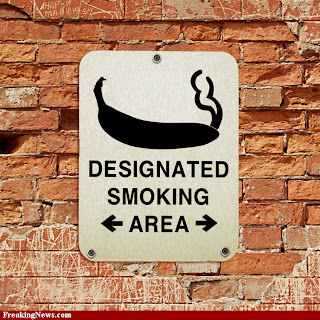
The San Diego City Attorney's Office is reviewing a draft of an ordinance that could ban smoking in the common areas of multi-family complexes. The draft was created by a task force assembled to examine the impact of second-hand smoke at apartment and condo properties. However, there are a lot of questions for the ordinance.
"Legally, can this be done? If so, what would it look like?" said San Diego City Councilwoman Marti Emerald, who is a part of the Public Safety and Neighborhood Services Committee.
Emerald has pushed the city attorney's office to review the ordinance so that it can be presented back to the committee and, eventually, the full City Council.
However, Emerald said she understands it may be hard where to draw the line and not impede on the rights of smokers.
"And while I may not be a smoker today, I have in the past, so I sympathize with the rights of smokers as well as non-smokers," she said.
Thirteen California municipalities currently have similar smoking bans for common areas in multi-family complexes.
Proposed smoking ban raises controversy at public hearing

The second public hearing regarding Richmond County's proposed smoking ban was a packed house. Very few seemed undecided; most either strongly support the ordinance...or outright hate it. Amy Lewis was one of the first speakers Monday night, expressing a concern that the law is unreasonably attempting to force everyone to live in a "plastic bubble." She concludes, "If you want to go crawl in your plastic bubble, you have the ultimate right. You go crawl into your little bubble. And while you're there--- zip it up."
Several doctors, nurses and health advocates spoke out, too, arguing that employees of bars have the right to work in a smoke-free environment. Cheryl Wheeler is the Advocacy Chair for the American Cancer Society. "I have the opportunity to work in a healthy environment, and everyone deserves that. A healthy environment." Cheryl says she is just as passionate about helping smokers quit. "I've seen the impact professionally and personally of the impact of both smoking and exposure to second hand smoke."
Lewis and several other protesters of the ban say "do-gooders" supporting the ordinance are infringing on their legal right to smoke. Bar owners are also concerned with infringement of right; for example, their right to run business however they please and appeal to whomever they desire, smoker or non-smoker. "If a person doesn't want to go in a bar that smokes, don't go there! They have plenty of bars in Augusta and Richmond County that have non-smoking already," insists R.W. McClellan. He's owned and worked in his bar for eighteen years. He is not a smoker, but smoking is allowed in his bar. McClellan points out, "I'm one who's being exposed to this second hand smoke they are talking about." But, he explains, he's invested in "smoke eaters," fans that suck in and purify air around the bar. "It comes out cleaner than the air outside around here," McClellan believes.
McClellan also says if the new ordinance is passed and enforced, bar finances will go up in smoke. "We'd all be out of business. Richmond County's gonna be in trouble because i will cost them millions of dollars over the years." He worries non-smoking laws will push customers elsewhere. Sheila Hernan agrees and summarizes her speech to the crowd in a quick seven seconds. "Smoking is legal; Drinking is legal; My business is legal. 98% of my customers smoke. This will probably shut us down."
Lora Hawk supports the ordinance and questions, "I have to ask you- where is the business going to go? Is it going to go to Columbia County? Because they already have an ordinance. Is it going to go to Aiken, South Carolina? Because they already have an ordinance, too. All your neighbors already have the ordinance." So do 500 other municipalities across the country, she says, in addition to 29 entire states with smoking ban laws.
Noah Garcia brings up his concerns with the language of the law. "If the ordinance is to prevent second-hand smoke, then why are electric cigarette devices listed, too?" He starts up his electric cigarette, showing a the minimal amount of smoke it produces. Garcia says he's used the nicotine-only device as a way to ween off of cigarettes. "There's no fire, no combustible plant matter, there's no trash. You don't litter, there's no nothing. And there's no smoke! You can't say that it's harmful to anybody else but me."
понедельник, 10 октября 2011 г.
Chile Supreme Court OKs medical marijuana company
Chile's Supreme Court ruled Friday that the government unconstitutionally revoked a company's permit to grow medical marijuana.
But a lawyer for the government said Chile remains a long way from allowing the production and sale of marijuana for therapeutic purposes.
The court ruled unanimously that Chile's agriculture service unfairly canceled the permit it granted Agrofuturo in 2009 to cultivate marijuana for therapeutic products. The service based its cancellation last year on a health service prohibition against including marijuana in pharmaceutical products.
"We find ourselves very happy" with the ruling, Agrofuturo owner Alvaro Gomez told The Associated Press in a phone interview from the city of Los Angeles in Chile's southern Bio Bio region, where the marijuana would be grown.
Gomez declined to comment further.
The judges focused their decision on due process requirements, and didn't make broader statements inviting a medical marijuana boom in Chile. It is legal in Chile to consume marijuana alone on private property, but against the law to consume it in groups or grow it without a government permit.
When the company applied for its permit, it laid out plans to sell the marijuana to be drunk as infusions, in bags similar to tea, and said that whether its sale would require a doctor's prescription would be determined by Chile's Public Health Institute.
The institute, however, clarified this year that producing, transporting and distributing marijuana remains prohibited in Chile and that legal use would be permitted only as part of scientific research. Jorge Correa, a lawyer for the agricultural service, says the health institute still has the last word on marijuana production.
The Chilean courts in 2005 absolved a woman who grew and consumed marijuana inside her home to ease pain from arthritis and rheumatism, but that ruling also failed to set a precedent for a medicinal marijuana industry.
But a lawyer for the government said Chile remains a long way from allowing the production and sale of marijuana for therapeutic purposes.
The court ruled unanimously that Chile's agriculture service unfairly canceled the permit it granted Agrofuturo in 2009 to cultivate marijuana for therapeutic products. The service based its cancellation last year on a health service prohibition against including marijuana in pharmaceutical products.
"We find ourselves very happy" with the ruling, Agrofuturo owner Alvaro Gomez told The Associated Press in a phone interview from the city of Los Angeles in Chile's southern Bio Bio region, where the marijuana would be grown.
Gomez declined to comment further.
The judges focused their decision on due process requirements, and didn't make broader statements inviting a medical marijuana boom in Chile. It is legal in Chile to consume marijuana alone on private property, but against the law to consume it in groups or grow it without a government permit.
When the company applied for its permit, it laid out plans to sell the marijuana to be drunk as infusions, in bags similar to tea, and said that whether its sale would require a doctor's prescription would be determined by Chile's Public Health Institute.
The institute, however, clarified this year that producing, transporting and distributing marijuana remains prohibited in Chile and that legal use would be permitted only as part of scientific research. Jorge Correa, a lawyer for the agricultural service, says the health institute still has the last word on marijuana production.
The Chilean courts in 2005 absolved a woman who grew and consumed marijuana inside her home to ease pain from arthritis and rheumatism, but that ruling also failed to set a precedent for a medicinal marijuana industry.
Figures show smoking decline in Tayside

Graeme Dey, MSP for Angus South, has expressed his delight at figures which show more than 14,000 people have attempted to stop smoking in the NHS Tayside area in the last three years. The figures cover the period April 2008 to March 2011.
Mr Dey said: “Leading a smoke-free life is one simple way to improve your health dramatically, and I am very pleased to see so many people in Angus South attempt to quit the habit.
“These figures show that right across Scotland people are determined and willing to stop smoking, which will go a long way to make us a fitter, healthier and happier nation, never mind the positive impact it will have on your wallet.
“The figures also show that we have a strong support network of health professionals across Angus and Tayside ready to provide help and advice, and NHS Tayside should be commended for this.
“There is always work that needs to be done to tackle the challenge smoking provides however, but the tough new display regulations for cigarettes and tobacco introduced by the Scottish Government will further improve matters.
“As we continue to try and be smoke-free, and with major sporting events such as the Ryder Cup and the Commonwealth Games heading to Scotland very shortly, I’ve no doubt people will be much keener to kick their habit into touch.”
Marijuana processing business planned for Albany

An Albany woman plans to open a marijuana processing business next month to convert the weed provided by medical cardholders into a smokeless substance.
Owner Rhea Graham, 50, who has a medical marijuana card, said she expects to be flooded with customers when she begins operating Albany’s Canna Kitchen & Research on Friday, Nov. 11, Veterans Day.
“I chose that day because I am a 20-year Air Force veteran, the power of 11/11/11, and I expect people will want to drop by after the parade,” she said.
At her business, Graham will wash the marijuana and then process it primarily into butter, oils, tinctures, salves and capsules.
Albany police Capt. Eric Carter said this about the new business in an email:
“This particular situation is a new twist on things; however, as far as marijuana dispensaries are concerned, we are in discussion with the district attorney’s office and conducting the research necessary to come to a conclusion as to the legality of what is being proposed.”
Graham, who has lived in Albany 13 years, wants to emphasize her operation is not a place where people will go to hang out. She is there only to conduct business.
She also wants people to know how important it is to wash their medical marijuana.
“You wash your lettuce, don’t you?” she said. “When the plants grow, people spray for mites and other things but they don’t want to clean the plants because they are afraid they will wash off the THC, the psychoactive part of marijuana, but that’s not the case.”
Graham said she expects to do well because no one else in the area provides the same service.
David Martineau, a planner with the city, said his department is reviewing Graham’s site plan application. So far, he has not seen any problems with it.
Her location is zoned light industrial, and Graham’s business meets the city’s code criteria for that site. Previously, the 2,075-square-foot space her business will occupy contained a grass seed packing operation.
“Anytime there’s a change in the use of a building, we look to see if any additional impacts will be created, such as whether there will be a need for more parking, if there will be more foot traffic, any number of things,” Martineau said. “From what we can tell, we think there will be just 10 members a day going to the business.”
Graham said her hours are still in flux. She will be open Tuesday through Saturday starting at 11 a.m. She does not know if she will close at 6 or 8 p.m.
четверг, 6 октября 2011 г.
UO to go tobacco-free in 2012

Starting in fall 2012, smoking will be banned on all University of Oregon property - including areas used by tailgaters outside Duck football games at Autzen Stadium.
Under the new smoke-free campus policy, smokers will literally have to leave campus to smoke a cigarette. The exact boundaries of the ban - and any penalties for violating the ban - have not yet been determined.
"With tighter tobacco control policy, that more people do quit and less people start, and that's an advantage to everybody," said Paula Staight with the UO Health Center, "And we know the majority of people do want to quit."
Students and staff will have free access to gum and patches to help quit. Will it work?
"I don't think it helps much honestly, because anybody who smokes will just walk off campus," said freshman Chris Richter.
Junior Wes Crosswhite smokes five to 10 cigarettes a day. A campus rule isn't going to make him give it up.
"I don't want to right away," he said, "so it's not fair to me. It will really suck, because U of O is a big campus. I'll have to smoke 15 minutes that way or 10 minutes that way before I can go to class. And in between classes I won't get any smoking time, either."
That means the hustle and bustle of campus will be smoke-free.
"I feel great about that," said Jojoe Nujoy, a UO grad student. "It's just really annoying when the smoke is blowing in your face."
"I don't mind if people are doing it in designated areas," said freshman Kim Ames, "but when i'm walking, I don't want to smell it."
Augusta Commissioners To Discuss Smoking Ban Proposal Cancelled

Augusta Commissioners will hold a public meeting Wednesday evening to talk about a proposed smoking ban in Augusta.
The Richmond County Board of Health's proposal would snuff out smoking in just about every public place in the city.
If you want to let your feelings be known about the proposed ban, you can take part in the meeting Wednesday night at 6:00 p.m. in the Augusta Commission Chambers at the Augusta Municipal Building.
Ruling on smoking ban looms
Proponents and opponents of Springfield's smoking ban could see a ruling on the disputed ordinance in about a week.
That's the estimate Associate Circuit Judge Jason Brown gave Wednesday at the end of a summary judgment hearing.
Jean Doublin, who owns Ruthie's Bar on Commercial Street and is suing the city over the ban, said she was satisfied with attorney Jonathan Sternberg's arguments during the hearing attended by several tavern owners.
"I hope he decides in our favor," Doublin said after the half-hour hearing .
Brown, who heard arguments from Sternberg and assistant city attorney Marianne Landers Banks, said he anticipates making a ruling soon.
"Hopefully, within the next week," he said.
Earlier this year, Brown refused to issue a restraining order to halt implementation of the ordinance.
There was no clear hint on how the judge might rule after hearing each attorney's arguments.
The judge's questions raised issues he'll consider.
He indicated a central question is whether the ordinance that's been in effect since June 11 is regulation or prohibition of smoking in what are considered public places.
Sternberg argued that Ruthie's is not a public place because it displays signs notifying customers that it has no accommodations for non-smokers.
That means state law overrules local ordinances, he contended.
"What the city has done here is outright prohibition of what the state allows," he said.
Banks argued a sign does no such thing and it does not prevent a tavern from being considered a public place and covered by the ban.
Before the hearing, Sternberg said the judge's ruling won't end the legal battle over smoking in Springfield.
That's because whoever loses, an appeal can be expected, he said.
That's the estimate Associate Circuit Judge Jason Brown gave Wednesday at the end of a summary judgment hearing.
Jean Doublin, who owns Ruthie's Bar on Commercial Street and is suing the city over the ban, said she was satisfied with attorney Jonathan Sternberg's arguments during the hearing attended by several tavern owners.
"I hope he decides in our favor," Doublin said after the half-hour hearing .
Brown, who heard arguments from Sternberg and assistant city attorney Marianne Landers Banks, said he anticipates making a ruling soon.
"Hopefully, within the next week," he said.
Earlier this year, Brown refused to issue a restraining order to halt implementation of the ordinance.
There was no clear hint on how the judge might rule after hearing each attorney's arguments.
The judge's questions raised issues he'll consider.
He indicated a central question is whether the ordinance that's been in effect since June 11 is regulation or prohibition of smoking in what are considered public places.
Sternberg argued that Ruthie's is not a public place because it displays signs notifying customers that it has no accommodations for non-smokers.
That means state law overrules local ordinances, he contended.
"What the city has done here is outright prohibition of what the state allows," he said.
Banks argued a sign does no such thing and it does not prevent a tavern from being considered a public place and covered by the ban.
Before the hearing, Sternberg said the judge's ruling won't end the legal battle over smoking in Springfield.
That's because whoever loses, an appeal can be expected, he said.
Michigan Study Shows Positive Results for Smoking Ban

A new study released by the Michigan Department of Community Heath shows the positive health effects the Dr. Ron Davis Smoke Free Air Law is having on the state of Michigan. The study, measuring air quality in restaurants, confirmed a 93 percent reduction in the level of dangerous particulate matter in the air after the law went into effect.
The MDCH study was conducted in 77 restaurants that allowed smoking prior to the passage of the law. According to the study, 85 percent of those establishments registered poor to dangerous air quality prior to the law’s passage.
“A 93 percent drop in particulates is significant,” said Judy Stewart, campaign manager for the Michigan Campaign for Smokefree Air. “It shows that the law has leveled the playing field and given bar and restaurant workers the same right that most of us in Michigan enjoy—the right to work in a safe and clean environment.”
Michigan became the 38th state in the nation to implement a smokefree air law on May 1, 2010. This new study showing cleaner and healthier work environments complements other research showing the law has had no net negative economic impact on business in our state.
“Critics of the smokefree air law, to this day, pay little attention to the health benefits of the law and choose instead to turn it into a political and partisan issue,” said Stewart. “What they ignore is the fact that smokefree air laws make for healthier employees, help increase worker productivity, lower the burden on Medicaid and Medicare by reducing health care costs for tobacco-related diseases, and overall, save lives by reducing exposure to a dangerous carcinogen—secondhand smoke.”
The Michigan Campaign for Smokefree Air commends Michigan policymakers for following the lead of a majority of other states and making Michigan smokefree. The most current poll (May 2011) of Michigan voters shows that 74 percent support the law and 93 percent say they will frequent bars and restaurants as often, or more often, than before the law was passed. “There is no question that this law is good for Michigan,” said Stewart.
Smoking hits women harder than men in every which way

A new study has claimed that women who smokec cigarettes have heart attacks at younger ages and are more likely than men to suffer complications months after a cardiac arrest.
According to the study by the University of Michigan Cardiovascular Centre, although fewer women than men smoke in the United States, the gender gap is decreasing, suggesting the toll of smoking is greater on the health of women.
“Smoking is not good for men or women but our analysis shows that women who smoke do worse six months after a heart attack than men,” Elizabeth Jackson, senior author of the study, said.
“We were not able to look at the basic biological mechanisms that would account for this, but other studies can give us some ideas.
“The ideologies of acute coronary syndrome may be different and the atherosclerotic burden greater for women,” she stated.
Jackson and lead author of the study Michael Howe conducted a study to examine the smoking status of patients during and six months after an acute coronary syndrome event, such as a heart attack.
They used the U-M Health System’s acute coronary event registry which has data on 3,588 patients admitted to the U-M Medical Centre from 1st January 1999 to 31st December, 2006 with a diagnosis of ACS.
A reported 24 percent of patients were actively smoking and male smokers were nine years younger than non-smoking men when admitted for their cardiac event, whereas smokers were 13 years younger than non-smoking women when admitted.
Among smokers, gender was a significant factor for risk of complications after a heart attack as six months after their cardiac event, 13.5 percent of female smokers needed emergency treatment to restore blood flow compared to 4.4 percent of male smokers who needed an unscheduled revascularization.
“The differences in outcomes among women smokers may reflect inherent biological differences between genders, or possibly less aggressive medical management of women that’s been described by other investigators,” Howe said.
“Either way, it clearly emphasizes the need for increased physician awareness and vigilance, in women in particular, after an acute coronary event,” he added.
The study has been published in the American Journal of Cardiology.
Outdoor smoking ban coming to Victoria region, mayors say
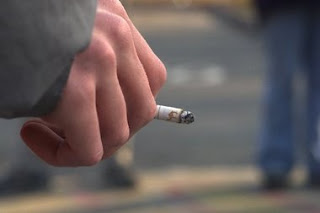
The days of enjoying a leisurely smoke on a Greater Victoria park bench or at the beach could be numbered.
The capital region undoubtedly will follow other municipalities in considering a smoking ban in outdoor areas, such as parks, playgrounds, beaches and trails, local politicians say.
"It's a big issue for parents," said Victoria Mayor Dean Fortin, adding residents are often as much concerned about smokers tossing cigarette butts as they are about second-hand smoke.
"I've had several people raise it as an issue for them. It's something we should take a look at."
The trend for smoke-free parks, playgrounds, beaches and trails is picking up steam.
About 50 municipalities across the country have enacted bylaws restricting smoking in open areas, such as parks and playgrounds. Smoking will be banned in regional parks and trails in Metro Vancouver from Jan. 1. Nanaimo is poised to pass a similar ban.
Saanich Mayor Frank Leonard said the subject undoubtedly will come up before the Capital Regional District, sitting as a board of health.
"These things work their way around the province. What we're doing today was unthinkable 25 years ago. What we do going forward, I think, will be just as progressive. But we've learned you need to move with public will," Leonard said.
Items such as smoking bylaws are better handled regionally than by individual municipalities, Leonard said.
"I think these sorts of things are just too confusing if they are patchwork," he said.
Dr. Richard Stanwick, Vancouver Island's chief medical health officer, has identified smoking regulations in parks as one of his areas of interest, as well as underage tanning and underage tattooing.
He has said that he will monitor the issue of tobacco smoke in parks and near playing fields to gain a better understanding of the risks and track community support for regulation, as well as for smoke-free buffers around elementary schools.
CRD chairman Geoff Young said he has no doubt the issue of smoking restrictions in parks will be back before the board, but noted health effects of second-hand smoke in parks are not as clear-cut as they are indoors, on patios or around doorways.
среда, 28 сентября 2011 г.
Liberia Enforces Public Smoking Ban
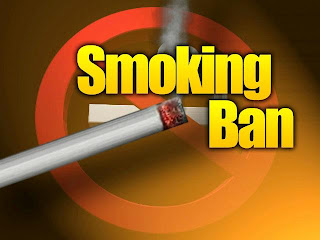
Liberia has begun implementing legislation passed in 2008 that prohibits smoking in buses, restaurants, workplaces, and other public places. The ban also prohibits those under the age of 18 from buying or using tobacco products.
The ban is part of efforts to check increased rates of tobacco use and the attendant health concerns and costs.
Global public health experts say it remains a challenge to educate Africans about the risks of secondhand smoke, which contains dangerous compounds like tar, benzene and carbon monoxide. Secondhand smoke has been linked to cancer, low birth weight and chronic lung-related illnesses, particularly in children.
"An example of this would be people who are suffering asthma," says said Liberian public health expert William Roland. "Someone suffering from asthma is sitting near someone who is smoking, and that person is going to have what we call hyper-secretion, a hyper-sensitivity to the smoke [that] produce more mucus in their respiratory tract that will cause pulmonary obstruction."
Though rates of tobacco use in sub-Saharan Africa remain relatively low, health experts say they are climbing faster than anywhere else in the world.
Africa is what tobacco industry heavyweights call a growing market. Public health experts say it could be the site of a "pandemic" of smoking-related illnesses, such as heart attacks and cancer. Experts warn that these diseases, though preventable, could cripple Africa's already weak and under-resourced healthcare systems.
The Global Smokefree Partnership, which includes the American Cancer Society, says tobacco use in more than half of the African countries could double by 2021 if governments do not take swift action, such as banning public smoking and levying higher taxes on cigarettes to make them more expensive.
Liberia joins a handful of African countries, including South Africa, Kenya and Niger, that have passed public smoking bans in the past decade, though degrees of enforcement vary.
Some restaurant owners in the capital, Monrovia, worry that the smoking ban will hurt business. Others like Larry Togba say it will help.
"Most of my customers complain about other customers smoking in the restaurant," says Togba. "Even if I lose some of my customers for this, I hope the government will enforce this law."
Smokers like Tarnue Varnie in Monrovia, however, are less than pleased.
"This is a serious violation of our rights [and] I totally disagree that smoking in public will cause health hazard," he says. "This is a habit that we can't easily put aside and I think the government needs to be concentrating on other critical issues instead of talking about public smoking."
The Liberian National Police are enforcing the smoking ban, and businesses or other public institutions caught in violation face fines of $10,000 to $25,000. Individuals found smoking in restricted areas or facilitating the purchase of tobacco products by minors face 2nd degree misdemeanor charges and fines of approximately $400.
Smoking ban in Boise bars, parks looms

More than 600 cities across the country, including El Paso, Texas; Corvallis, Ore; and New York City already ban smoking in bars.
Boise may follow suit if proposed Smoke Free Air Ordinances are approved.
The ordinances will be on the table Tuesday at a City Council work session. If passed, they will add new restrictions to state laws that already ban smoking in public areas like restaurants, elevators and most workplaces. The entire Boise State campus is smoke-free.
Along with bars, the ordinances would prohibit smoking in other places where people work and gather, including home-based businesses and tobacco shops.
The city says public sentiment is on its side.
A Boise City 2010 Citizen Survey found that approximately 70 percent of Boise residents agree the city should ban smoking in all indoor public places, including bars.
Others disagree.
“People come in, ask if they can smoke, sit down, and read a magazine,” said Stan Minder. The owner of Hannifin’s Cigar Shop, a city institution for more than a century, isn’t a smoker himself. But he wants his customers to be able to enjoy their conversations and tobacco.
“So many places have banned smoking already,” Minder said, adding that customers have to be 18 to come through his door. “When people come into a smoke shop, they know what they’re coming into.”
People love the old-time cigar-box scent of Hannifin’s, he said.
Some local bars, like Pengilly’s in Downtown Boise and the Crescent Bar on the Boise Bench, are ahead of the curve and have gone smoke-free voluntarily.
Customers smoked their last cigarette inside the Crescent in August. Owner Butch Morrison said he’s been anticipating a smoke ban for a long time.
Local anti-smoking advocates have worked for a ban in bars for several years. Council members Elaine Clegg and Alan Shealy got the council to start the process for developing a smoke-free ordinance back in December.
“Pretty soon, you get to the point that people won’t go out if you keep restricting things they want to do. But it’s kind of like you can’t fight City Hall,” said Morrison. “And we wanted to be part of the solution.”
The smoke ban hasn’t hurt his business. Fewer smokers mean more people come to the bar to order food, he said.
Smoking is still allowed on the Crescent’s outdoor patio — and would be OK under the new ordinance, which allows for smoking on privately owned outdoor patios designated for those 21 and older.
Places like bowling alleys, with separate, designated areas for inside smoking, would be out of luck.
Other bars are joining Hannifin’s side and are staunchly against the ban. It would hurt their ambiance, they say.
“People know that when they come to the 44, it’s a smoky bar,” said Jody Ciancia. She’s tended bar at the 44 Club on State Street for seven years.
She estimates that about 80 percent of the bar’s regular customers are smokers. She smokes and doesn’t like the idea of bar patrons having to stand outside in the winter to enjoy their cigarettes.
“Smoke is what makes the 44. A little, tiny, dark bar that’s been here forever,” said Ciancia.
Clegg and Shealy say they both grew up in families with smokers and suffered ill effects from secondhand smoke.
Clegg cited a recent study that shows the effects of secondhand smoke are more dangerous than previously thought.
“Safe workers are our primary focus,” she said.
Shealy said the economic costs of smoking are dire for Idahoans. The Centers for Disease Control estimate that the annual health care costs in Idaho directly caused by smoking total $319 million a year.
Enforcement of the proposed ordinances would rely more on compliance than on issuing tickets, said city spokesman Adam Park.
For example, if someone lights up in a bar, is asked to put out his cigarette and does, or leaves, he won’t be ticketed.
In cases where violators are ticketed, they’ll face a $69 fine.
Employers who knowingly permit smoking in prohibited areas would be fined $119.
The proposed ordinances also would extend the smoking ban to city parks and the Greenbelt. Fifty-three percent of respondents to the city’s 2010 survey were in favor of that idea.
четверг, 22 сентября 2011 г.
California Program Collects $1.6 Million in Internet Cigarette Taxes

A program in California is collecting state excise taxes and use taxes from people who purchase untaxed tobacco products via out-of-state Internet, mail or telephone sales.
Internet cigarette sellers are required to turn information over to the state about who is buying cigarettes from them. While the state has been sending invoices to those purchasers "for some time," for fiscal year 2010 to 2011, the State Board of Equalization (BOE) issued 1,723 billings resulting in $1.6 million in revenue. The previous year, BOE issued 3,077 billings, resulting in $232,424 in revenue.
Anita Gore, spokesperson for the BOE, told Tobacco E-News that it "beefed up efforts" in 2005 and brought on more staff to help with a backlog of invoices that arrived from the out-of-state retailers.
"People are quite often surprised when they get a bill," she said. In fact, a recent article in the Contra Costa Times, documented one Internet customer who received a bill for $1,398 from the BOE for back taxes and penalties on over 100 cartons purchased between 2007 and 2008. He had purchased the cigarettes on the Internet, because they were "substantially cheaper." But he told the paper that he "got caught" and would pay the tax.
"You know that when you go to a store and make a purchase, you pay both sales tax and excise tax," Gore said. "If you make those purchases online, you most likely know you're getting away without paying it—and that it is due. It's that old adage: If something looks too good to be true, it probably is."
22nd Century Delivers Proprietary Research Cigarettes for U.S. Government Order
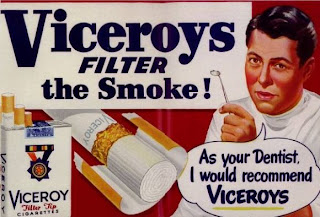
Century Group, Inc. XXII -6.25% , a company focused on smoking cessation and tobacco harm reduction products, announced today that the company has shipped more than 9 million SPECTRUM(R) research cigarettes. SPECTRUM(R) was developed by 22nd Century for the U.S. government and is strictly for independent research purposes. SPECTRUM(R) will not be sold as a commercial cigarette in the U.S.
The SPECTRUM(R) product line essentially consists of a series of cigarette styles that have a fixed "tar" yield but varying nicotine yields over a 35-fold range--from very low to high. Altogether, SPECTRUM(R) features 24 styles, in both regular and menthol versions, with 8 levels of nicotine in its tobacco. By far, the most prevalent style of SPECTRUM(R) produced for researchers is the very low nicotine (VLN) version, which has 97% less nicotine than conventional "light" cigarettes.
As the only company in the world able to produce VLN tobacco products, 22nd Century was chosen to supply its proprietary SPECTRUM(R) research cigarettes as a subcontractor under a 5-year federal government contract. Previously, 22nd Century's management met with independent researchers and officials from National Institute on Drug Abuse (NIDA), U.S. Food and Drug Administration (FDA), the National Cancer Institute (NCI) and the Centers for Disease Control and Prevention (CDC) to discuss and finalize certain design features of these research Wont cigarettes.
"Working with these researchers and officials from federal public health agencies has been a terrific experience. Throughout the process, the investigators provided 22nd Century input on their research objectives and shared insights into what types of cigarettes would best facilitate their independent studies," stated Joseph Pandolfino, founder and chief executive officer of 22nd Century.
Dozens of research studies will be conducted with SPECTRUM(R). The research will include: (i) smoking cessation studies, (ii) exposure studies comparing how different nicotine levels in cigarettes affect smoking behavior and exposure to smoke toxins, and (iii) studies to determine whether there is a threshold nicotine level in cigarettes which does not produce dependence. Many of these studies would be very difficult, if not impossible, to conduct without SPECTRUM(R).
Mr. Pandolfino added, "22nd Century is pleased that SPECTRUM(R) will be used to provide answers to important research questions likely to affect tobacco public policy for years to come. I am optimistic that the results of these studies will be applied to reduce the harm caused by smoking--the leading cause of preventable death in the U.S. and the world, according to the CDC and the World Health Organization."
Major retailers hit with new cigarette and alcohol tax

The proposal — condemned by large business organisations — follows the failed ''Tesco Tax'' the SNP attempted to include in this year's budget.
Mr Swinney said the new tax was ''fair and proportionate'' and a vital revenue-raising measure given a backdrop of a real-terms reduction in the budget of £1.6 billion between this year and 2014-15.
He estimates £110 million will be generated in the next three years by imposing the levy through a business rates supplement on premises with a rateable value above £300,000 that sell tobacco and alcohol.
He confirmed a further one-year freeze on public sector pay — including the wages of ministers.
And he admitted that pension employee contributions will have to be raised for teachers, NHS, police and fire schemes despite his party's objection to the UK Government measure.
Mr Swinney told MSPs his review fell at a ''defining moment'' against the backdrop of ''savage reductions'' from Westminster.
But he said the new parliamentary majority allowed a ''decisive shift'' to preventative spending measures, which will see the state intervening earlier in social issues.
Explicitly linking the move to the new business tax, he added: ''Scotland's health and social problems associated with alcohol and tobacco use are well documented and are something we are firmly committed to addressing.
''These problems affect not only the health of the population, but create additional burdens on policing, local authorities and the NHS.''
But Ian Shearer, director of the Scottish Retail Consortium, attacked the tax, saying: ''This ... is a blatant fundraising exercise which is illogical and discriminatory.''
However, it was welcomed by Andy Willox, of the Federation of Small Businesses, who said: ''Moves to make large out-of-town retailers pay a more proportionate level of rates will be welcomed by many of our members on the high street.''
Mr Swinney said ''tough choices'' were needed to balance the books, calling for further savings in public services.
Confirming the public sector pay freeze for the coming year, he hoped it would be the last before ''modest increases.''
Any employee earning less than £21,000 will continue to receive at least a £250 rise in their salary.
Mr Swinney also confirmed the measure of switching more than £750 million from the Scottish resource budget to the capital budget in an attempt to stimulate economic growth.
Labour's finance spokesman Richard Baker said: ''If councils are to meet the costs of the SNP's pledges, it will mean more council workers losing their jobs, further cuts in service and the evidence of the last parliament is that education and social work budgets will be particularly badly hit.''
Conservative finance spokesman Gavin Brown said the SNP was failing to ''match rhetoric with reality,'' while Lib Dem leader Willie Rennie defended the spending decisions taken by the UK Government.
Health Advocates Propose Raising MO Cigarette Tax

It's an issue that gets people on both sides fired up. Should Missouri raise its cigarette tax? Voters may soon get another chance to weigh in as the proposal could make it on the ballot for the November 2012 general election.
Missouri currently has the lowest cigarette tax in the nation. It's something health advocates want to change by raising the tax by 80 cents a pack.
"It's people's choice to smoke", said Jeremy Pierce of Jackson.
With the proposed increase, the cigarette tax could jump from 17 cents to 97 cents.
"That's ridiculous," said Pierce. "They want to charge us more for something we've been doing for years."
Many smokers cross the state line to buy Vogue cigarettes like Lawrence Jackson from Anna.
"In Illinois they increased the tax and were supposed to use money for certain things and haven't done it", said Jackson.
If voters approve this initiative, reportedly 50-percent of the money generated would go to elementary and secondary education.
30-percent would go to colleges and universities to train healthcare workers, and 20-percent would go toward tobacco prevention and programs to help people quit smoking.
"If they use the tax increase for what they say it's for I'm all for it," said Gail Gant of Marble Hill." I don't smoke, but I'm all for it."
According to the American Cancer Society, Missouri spends about $2 billion a year on healthcare linked to smoking.
The American Cancer Society also says bout 21-percent of Missourians smoke. Health advocates predict that number will drop if it costs more to light up.
"In every state that has ever introduced this kind of legislation has seen a decrease in the number of youth who start smoking," said Sheri House-Community Manager/Health Initiative American Cancer Society.
In a state where similar measures have failed in the past, once again it's up to voters.
"The first one to jump on is the smokers and it's not fair," said Lawrence Jackson.
"If they don't want to pay it, don't smoke," said Gail Gant.
Voters took up this issue back in 2002 and 2006.
Both times it was pretty close in Cape Girardeau County.
In 2002 on Proposition A in Cape County, 9, 761 people voted yes and 12, 290 voted no.
In 2006 on Amendment 3 in Cape County, 12, 989 voted yes and 14, 981 voted no.
If approved, the tax hike is expected to generate about $308 million a year in new revenue.
According to Sheri House with the American Cancer Society, the language in the proposition will need to be approved by the Secretary of State. House says that is something that could take up to 30 days. After approved, health advocates supporting this measure would begin gathering signatures.
Hospital Will Not Hire Those Who Use Tobacco Products
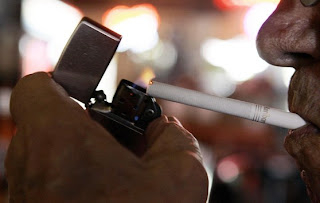
Administrators at a hospital in Searcy say you can't light up and work for them. Effective October 1, the White County Medical Center will not hire people who smoke or use tobacco products. Current employees will be grandfathered in under the new policy.
This change is in an effort for all employees to adopt a more healthy lifestyle. Not only is tobacco products not allowed, but cafeteria menu items are also changing.
Brenda Engle, the Director of Health Works at WCMC says by doing this, they are hoping to address the two biggest issues, smoking, and obesity. "As a health care facility we believe this is the right thing for us to do for our employees"
She along with other administrators have been working to make the atmosphere around the hospital a healthier one. About 200 employees use tobacco.
"For me I'm allergic to smoke, and it bothers me when I'm near someone who smokes. I can't be around them. so it's going to be positive change for me. I know for some it will be negative but we're trying to embrace it and it's all for a healthy change for our hospital", says Cassandra Feltrop, Executive Director of the hospital Foundation.
The hospital already conducts random drug testing on their associates. After October 1, a nicotine screening will be added. So if a new hire uses tobacco in the privacy of their own home or is using a patch or gum to kick the habit and tests positively, Feltrop says they will lose their job. "They will be terminated. After that date, the policy states they will be terminated from the hospital. We will no longer hire smoking associates."
The cafeteria is being revamped too. Fresh, new, healthier food choices will be offered including a fruit bar. All in an effort to help their employees live a more healthier lifestyle.
Подписаться на:
Сообщения (Atom)